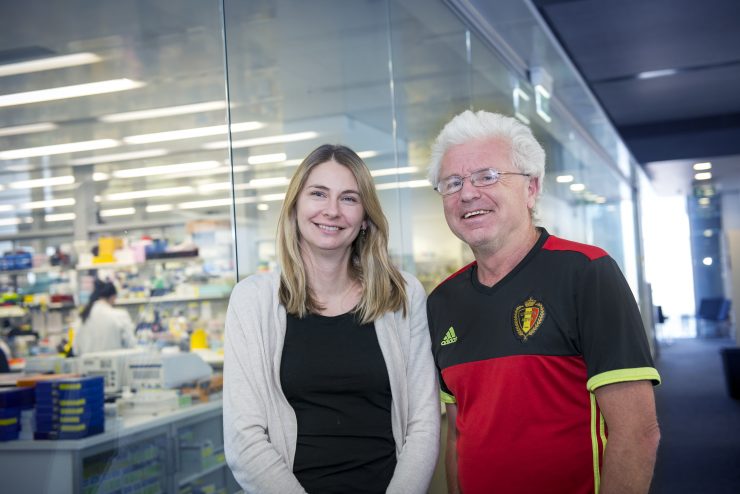Novel drug for treatment of Burkitt’s lymphoma
Research team: Professor Andreas Strasser and Dr Gemma Kelly (pictured)
Location: Walter and Eliza Hall Research Institute, Melbourne
Research aim: Identify alternative therapies for people with Burkitt’s lymphoma who do not respond to standard treatment or relapse
Burkitt’s lymphoma (BL) is an aggressive blood cancer. While BL often responds well to treatment, for 15-20% of BL patients, chemotherapy either doesn’t work well, they can’t tolerate the aggressive treatment or the lymphoma relapses quickly after treatment.
The Leukaemia Foundation awarded a two-year grant-in-aid of $250,000 (January 2018-December 2019) to Professor Andreas Strasser and Dr Gemma Kelly at the Walter and Eliza Hall Research institute (WEHI).
This grant was enabled through the generosity and vision of an individual supporter. It is through gifts such as this that allow the Leukaemia Foundation to take significant steps forward in blood cancer research.
Developing a novel anti-cancer drug for the treatment of aggressive Burkitt’s Lymphoma is the title of their research project.
Genetic mutations
Dr Kelly, who works in Professor Strasser’s laboratory, is an esteemed researcher in the field of lymphoma and has received the Burnet Prize – WEHI’s top science prize, awarded annually to early-career scientists who have produced pioneering research.
This project builds on 30 years of research, at WEHI and internationally, understanding how genetic rearrangements and mutations lead to abnormal protein expression which can drive cancer development. These proteins are implicated in 70% of all cancers, including leukaemia and lymphoma.
In recent years, and with prior support from the Leukaemia Foundation, researchers found cancer cells rely on a pro-survival protein called MCL-1 to live and grow. If cancer cells are genetically engineered in the laboratory to remove the MCL-1 protein, the lymphoma cells die very rapidly.
This finding identified MCL-1 as a therapeutic target for these particular lymphoma cells and now research is focusing on understanding the normal pathways that control cell death with the goal to manipulate this process to selectively kill cancer cells.
Project aims
- Obtain primary BL samples from patients and test if the tumour cells die when treated with a drug that targets MCL-1.
- Identify markers on BL cells that would predict which patients will respond well to a MCL-1 specific drug.
- Develop a blood test to confirm the drug is working against the targeted BL cells.
- Determine if combination treatments with the MCL-1 specific drug and low levels of chemotherapeutic agents would improve patient outcomes.
The new and promising MCL-1 specific drug will be used in clinical trials to treat people with BL. If successful, therapies could be available for clinical trials in 2-3 years.
